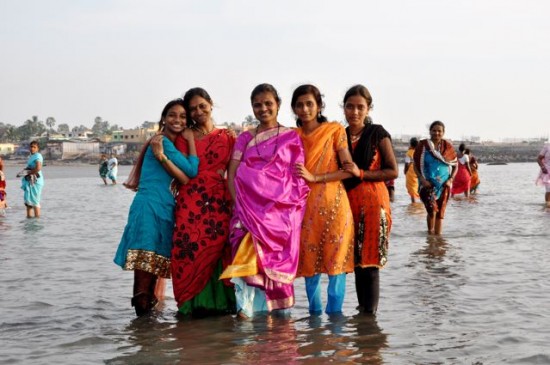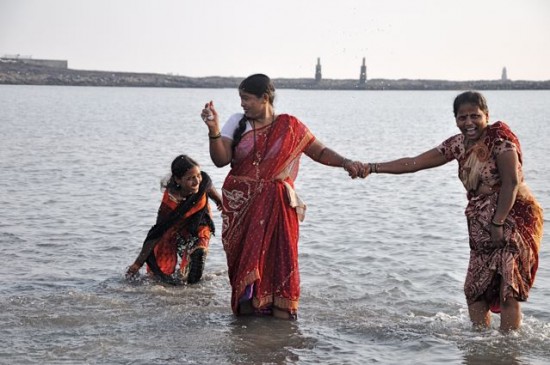Dirty Wall Project plans a carefree beach day for some deserving women who live in a Mumbai slum.
A young woman sits on her haunches, swinging a flat wooden stick. With a whoosh of water and a wet thud, the stick hits the balled-up piece of wet clothing. She repeats this process over and over, using her left hand to deftly manoeuver the wet clothing into a better position on the concrete. Beside her, a child of less than one year old sits on the wet concrete and watches soap suds pass her by. Her older sister stands in the doorway, watching her mother.
A fire flickers under a large steel pot in front of their home as their neighbour bends and stokes the flames with a baby on her hip. Up and down the pipeline in this slum and all across India, the poor women of this country toil in their meager living conditions. Their role in society has been defined by the caste system and the generations before them, and they are sadly under-appreciated. For a country trying so hard to move forward and advance their wealth and status on the world stage, they must not forget the significant role women have to play in their success.
Five months ago, Ashley and my mother and I had decided that we needed to take the women of the slum for a frivolous day out, away from their regular routine. Sadly, this never materialized as the building of the school took all of our efforts, time and money. The women have never let me forget about this plan. I was in the country less than 24 hours when the women reminded me that I had promised them a picnic.
What could possibly go wrong with two single guys planning a party for 60 women? Possibly everything, hopefully nothing! This is what I told myself as I walked toward the slum in the morning. I arrived to bad news. The bus we had arranged the night before had broken down. Meanwhile, up and down the laneways of the slum, women were packing small steel tiffens with home-cooked meals and dressing in their nicest saris, excitedly chatting to each other about the day ahead. We had to find another bus quickly. The networking began immediately. Anyone with a phone dialed a cousin or a friend, trying to locate a bus. As time passed, it was looking as though we would have to cancel the picnic, when at last Sujata found success!
By 11 am our bus had arrived. I stood by the door watching as women boarded the bus, leaving behind confused husbands and perplexed children. The temperature inside the bus exceeded 35 degrees, but this didn’t diminish the smiles of the women as we waited for the last few to arrive. The bus blew out a cough of blue smoke — and with a roar of the engine we were on our way, children waving and smiling, and some even crying with confusion as their mothers left behind their daily duties. The smaller children came along for the day.
I sat in the doorway of the bus as it wheezed its way through morning traffic. Haseena sat behind me and draped the loose cloth from her sari over my head to block the sun, inciting laughter from the whole bus. The women of Saki Naka have become my surrogate mothers, scolding me when my clothes are dirty and feeding me whether I’m hungry or not. I feel at home with these women, even though our communication is based on smiles, hand gestures, laughter, their halting English and my few words of Marathi. Our respect for each other knows no language barriers and I was enjoying the day already.
After 40 minutes in a sticky, humid bus we arrived at Borivali National Park. The cool shade of the trees felt welcoming. The open green space of the park was both refreshing and soothing to women who spend their lives living in a small rooms with five or more family members.
We headed towards the miniature train and boarded it like any commuter train in Mumbai, with no regard for the people standing next to each of us, just the pure adrenalin of getting on and finding a seat. I once again found space on the floor and watched as the women laughed and screamed with delight as we entered small tunnels and wind through the park.
From trains to boats, the ladies quickly spotted the lake and the colourful paddle boats shining in the afternoon sun. They lined up for tickets. Ashley handled the cash while I sat by the water’s edge capturing their smiles from behind the lens of my camera. Exhausted from peddling in circles, we collapsed on the grass and treated the ladies to ice cream.
Back on the bus we headed farther out of town, winding through a small fishing community — seemingly worlds away from the hustle of Mumbai — to find some respite on a beach. The women seemed unsure of the beach, and it took some prodding. We walked along the sand and headed toward a small shack surrounded by a thicket of palms. Ashley came to an agreement with the owner and for 300 INR ($6.80 CAD) we used the shade of his garden for lunch. We sat cross-legged on the ground. Tiffens were opened, rotis passed around, and the aroma of home-cooked curry filled the air.
With our bellies full, we kicked off our sandals and meandered towards the water. The beach was nearly empty and that helped to relax the women. A group of women reached the water’s edge and stood ankle deep, contemplating their next moves. It didn’t take long before the first splash hit an unsuspecting woman and laughter broke the ice. Soon, the ladies could be seen running, laughing and splashing their way to deeper water. Their beautifully coloured saris became wet and tangled as they played about. I couldn’t help but smile as I watched the women tackle each other and drag each other into deeper water, only pausing to laugh. The sun slowly started to dip in the sky, casting a purple hue along the beach. We gathered, dripping wet, on the sand.
Before the picnic, Ashley and I had spent a painstaking two hours trying to buy prizes and gifts for the women, and could only hope we had chosen appropriate items. The women were spit into groups and lined up to race for prizes, which included watches, cosmetics, shampoo, purses, nail polish and hair accessories. For the next hour, fierce competitions were held until all the prizes were gone.
The women gathered their things as the sun dropped into the Arabian sea and I couldn’t help but feel overwhelmed with happiness. To be able to give these women, who are so deserving, the chance at a frivolous, fun day away from the harsh realities of their lives is humbling. My work with Dirty Wall Project often puts me in delicate and difficult situations and it is days like this that I relish, the gift of unburdened fun, the chance to play and be free, even for a few hours, is priceless.
To the women of India and all around the world, I thank you. Men may not always admit it, but we need you and we are thankful for all that you do.
I look forward to many more laughs with these wonderful women. To all of the supporters that make it possible, thank you!
Cost of one day of beach fun: 8,600 INR – $ 195.45 CAD
Sincerely,
Kane Ryan
Photo Credits
All photos © Kane Ryan 2010. All Rights Reserved.









🙂 🙂 🙂 🙂